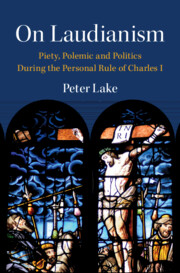Book contents
- On Laudianism
- Cambridge Studies in Early Modern British History
- On Laudianism
- Copyright page
- Contents
- Acknowledgements
- Abbreviations
- Introduction
- Part I Laudianism: Where It Came From
- Part II Laudianism: What It Was
- Part III Laudianism: What It Wasn’t
- Part IV Laudianism and Predestination
- Chapter 26 Laudianism, Puritanism and Arminianism Revisited
- Chapter 27 The Language of Mystery
- Chapter 28 Fatal Necessity
- Chapter 29 Predestination, the Positive Case
- Chapter 30 Faith, Hope and Charity
- Chapter 31 Effort without Merit, Reward without Desert
- Part V Laudianism as Coalition: The Constituent Parts
- Conclusion
- Index
Chapter 29 - Predestination, the Positive Case
Of Justice and Mercy, Prescience and Predestination
from Part IV - Laudianism and Predestination
Published online by Cambridge University Press: 05 October 2023
- On Laudianism
- Cambridge Studies in Early Modern British History
- On Laudianism
- Copyright page
- Contents
- Acknowledgements
- Abbreviations
- Introduction
- Part I Laudianism: Where It Came From
- Part II Laudianism: What It Was
- Part III Laudianism: What It Wasn’t
- Part IV Laudianism and Predestination
- Chapter 26 Laudianism, Puritanism and Arminianism Revisited
- Chapter 27 The Language of Mystery
- Chapter 28 Fatal Necessity
- Chapter 29 Predestination, the Positive Case
- Chapter 30 Faith, Hope and Charity
- Chapter 31 Effort without Merit, Reward without Desert
- Part V Laudianism as Coalition: The Constituent Parts
- Conclusion
- Index
Summary
This chapter discusses the positive content of the Laudians’ position on predestination. Particular attention is paid to seven authors prepared to deal with this topic in extenso – Edward Kellett, Robert Shelford, Thomas Chown, Thomas Hoard, Robert Jackson, Edmund Reeve and Robert Skinner, not to mention the anonymous J. A. of Ailward. The latter attempted to attribute an essentially Arminian version of the theology of grace to the English church though the appropriation of what at the time was regarded as an essentially heretical work, which survived only in the refutation of it by the Edwardian protestant, and future puritan, Robert Crowley. This chapter concerns itself with the relation between divine foreknowledge and the double decree. These discussions were often conducted in terms of the divine attributes, chief amongst them divine mercy and justice. On this topic particular attention is given to the work of Thomas Jackson and Robert Shelford.
- Type
- Chapter
- Information
- On LaudianismPiety, Polemic and Politics During the Personal Rule of Charles I, pp. 376 - 400Publisher: Cambridge University PressPrint publication year: 2023



